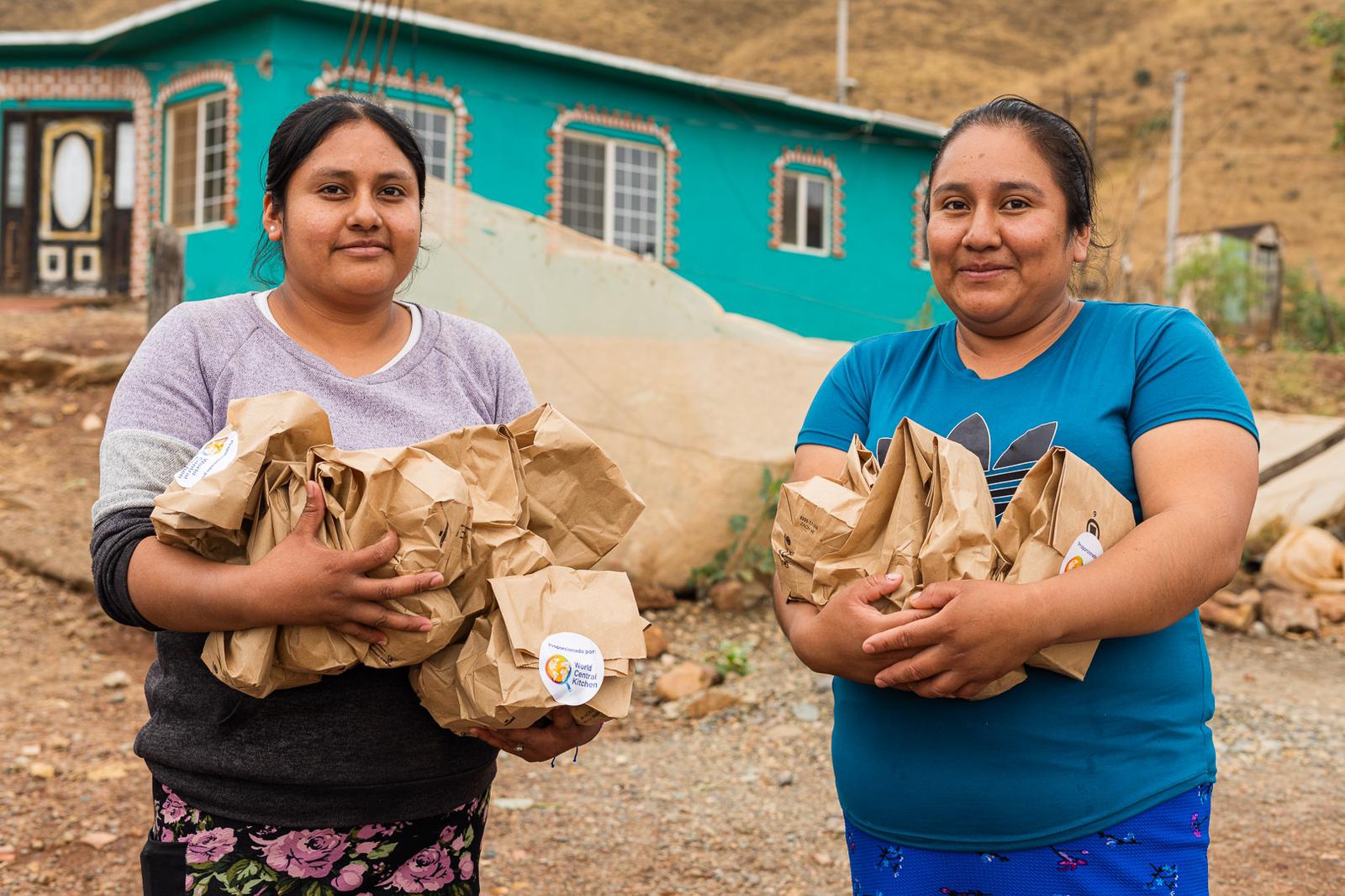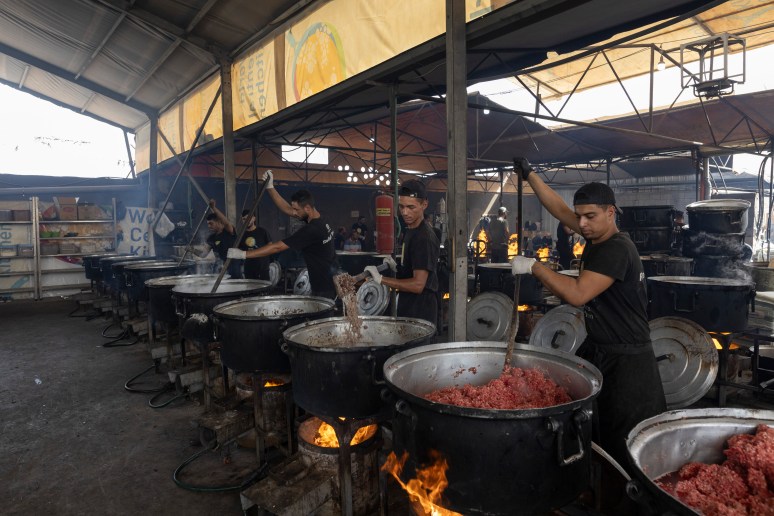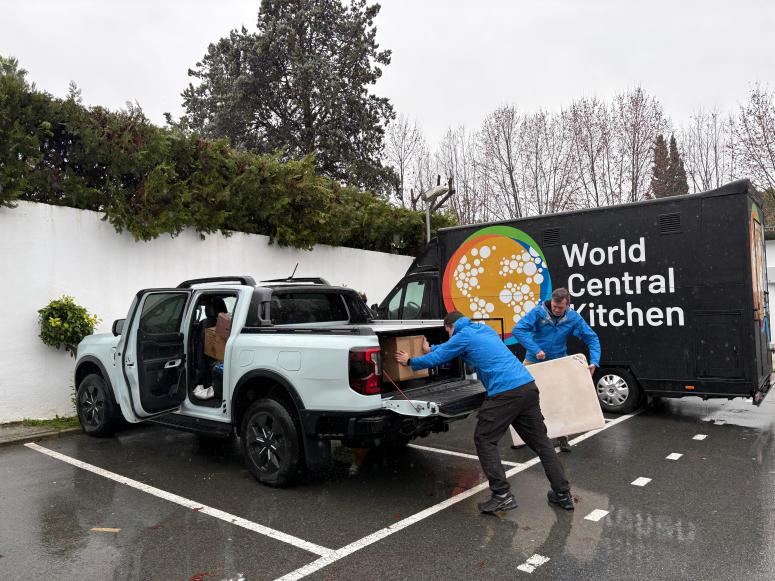WCK provides immediate support after Tropical Storm Hilary

Tropical Storm Hilary made landfall along Mexico’s Baja California peninsula before heading north into the United States. Original forecasts predicted the storm would make landfall with hurricane-level intensity, but the system thankfully weakened from a Category 1 hurricane to a tropical storm. WCK teams prepositioned in Mexico, California, and Nevada began assessing meal needs as soon as the storm passed through each region. In total, more than 5,700 sandwiches and meals were served to people impacted by the storm.
Mexico
By land and by air
Within hours of the storm hitting Mexico, we loaded sandwiches and water onto a helicopter in Cabo San Lucas and headed more than 400 miles north to Santa Rosalía, making several stops along the way to assess damage from the storm. Along with our air team, three separate teams traveled by land to scout impacted areas and assess food needs along the Baja Peninsula.
The maximum capacity on the helicopter was 200 sandwiches, not enough for the entire scouting trip. Anticipating greater need, our team placed orders to pick up more sandwiches in two towns along the route. In Santa Rosalía, the sandwiches and water were especially appreciated. The community had been impacted by flash floods the day prior, with a massive gouge in the ground showing the path the floodwaters took.
Our partners in Ensenada
To support families in Ensenada, a coastal city 50 miles south of Tijuana, our team partnered with Seki Japanese Baja Cuisine—a restaurant that fuses Japanese and local Baja flavors. Chef Ivan of WCK and Chef Oliver of Seki worked quickly to prepare 200 servings of teriyaki chicken, steamed rice, and vegetables. With the Seki crew in the kitchen cooking and the WCK team ready to pack and deliver meals, we were able to quickly get food to people in need.
After leaving Seki, our team met up with the local Rotary Club in Ensenada who helped us with meal distribution. Rotary Club members had identified an area on the banks of a river where a number of unhoused people were in need of meals. WCK worked alongside the club to serve the nourishing meals from Seki, along with apples and water.
United States
Communities in the southwestern US are not accustomed to hurricanes or tropical storms, so it was difficult to predict Hilary’s impact. WCK prepositioned teams in Los Angeles, Palm Springs, San Diego, and Las Vegas to begin supporting each location as soon as the storm passed. While some areas only experienced light flooding, other areas were less lucky, including Palm Springs where the fire department was performing swift-water rescues in the neighboring Cathedral City for the entire night following the storm.
Seniors in California
Just after the storm passed, one of our teams in Southern California heard an incredible story. Emergency workers had driven a bulldozer to an assisted living facility in Cathedral City to rescue fourteen residents. The care home had been inundated, many of the senior residents were covered in mud up to their waists.
After finding out where this group was moved to, Pragnya—WCK’s Emergency Response Lead—visited them to gather a list of needed supplies. Our team went out and got everything on the list—bread, oranges, juice, water, rice, vegetables, and other staples they asked for. When WCK returned to deliver the supplies, there were a lot of smiles. “Finding them and seeing their faces light up with the food and supplies was an absolute highlight,” said Pragnya.
A mountain in Nevada
While Hilary didn’t cause widespread damage, unique geographies caused the storm’s impact to be much greater in some areas than others. In Nevada, the Kyle Canyon region typically sees less than one inch of rain per year. During Tropical Storm Hilary, it got over 10 inches of rain. Because of the ensuing flooding, many Mt. Charleston residents had to be evacuated, and WCK was able to support those efforts.
With roads destroyed, rescue workers used ATVs to go up the mountain to find people who were stranded in their homes. The people who were rescued were brought partway down the mountain to a lodge where emergency services—including WCK—were staged. There, evacuees boarded buses to be driven the rest of the way down to a resource center or to reunite with family members. Thinking quickly, our team made sure these buses were stocked with sandwiches, meals, and water for evacuees to eat on their way down the mountain. Tyler, WCK’s Community Outreach Lead, called it “a really seamless collaboration” with the local rescue services—highlighting the importance of WCK’s partnerships with other emergency agencies.
With more than 3,500 meals served in the US and another 2,200 served in Mexico, our teams wrapped up this response. All these meals were served during the assessment phase of effort. This initial stage is crucial for our teams to identify areas of need following a disaster. While we delivered thousands of meals immediately after Hilary swept through the region, we saw that food needs were being met by local authorities. As a result, we were able to determine that a larger WCK response was not required.
Learn more about our efforts here. For real-time updates, follow WCK on Twitter, Instagram, and Facebook. Support our efforts by making a donation here.












